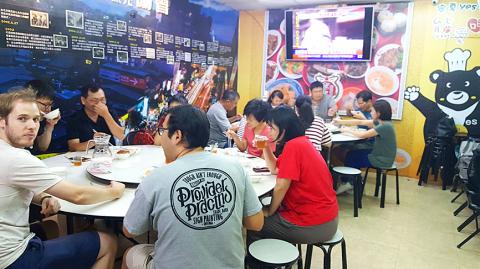The introduction of multilingual menus and other efforts by food stalls at Taipei’s Ningxia Night Market (寧夏夜市) to attract more international travelers in a bid to offset a decrease in Chinese travelers have been well-received.
The owners of food stalls and restaurants in and around the night market have begun offering services in English, Japanese, Korean and French, and have begun cooperating with travel Web site Klook to promote their businesses.
The efforts have already begun paying off, they said, adding that they have fared better than others in the tourism industry as a result.

Photo: Yang Hsin-hui, Taipei Times
China early this month instituted limits on travel to Taiwan by individual travelers.
“Although Ningxia is not near a MRT [metropolitan rail line] station like the Shilin (士林夜市) or Raohe (饒河夜市) night markets, it has its own special style,” said one owner, surnamed Lin (林). “While everyone is in a panic about the loss of Chinese tourists, we are unwavering.”
It is no accident that Ningxia has started attracting international tourists, Ningxia Night Market Tourism Association director Tim Lin (林定國) said on Saturday last week.
All signs at the night market are in at least two languages — Chinese and English — and many have as many as five, he said.
The owners of some of the stalls can speak a little of each language, which makes them more approachable for foreigners, he added.
“Foreign tourists who see their language on signage will feel that they are valued. It is like when Taiwanese travel abroad and see Chinese — they are happy and leave with a good impression,” proprietor Lin said.
The owners of Ningxia’s stalls and restaurants also prioritize cooperation to attract visitors over competing with one another, Tim Lin said.
Ningxia also distinguishes itself from other night markets through its annual “thousand years banquet” (千歲宴), which allows various establishments showcase their signature dishes, he said.
The banquet got its name from adding up the 50-year histories of each of the 20 establishments that participate, he added.
It was also the first night market in Taipei to allow electronic payment through services including EasyCard, Jkopay and Alipay, Tim Lin said.
International visitors can also rest assured that the food is safe, as stalls have quick response codes that visitors can scan to see a list of ingredients and from where they are sourced, he said.
Through Klook, visitors can find information about events held at the night market and download discount vouchers, he added.
One US tourist named Tom said that he had heard from a friend that there were many delicious and inexpensive food options at Ningxia.
Seeing signs and menus in English left him with a very good impression, he said.

Taiwanese can file complaints with the Tourism Administration to report travel agencies if their activities caused termination of a person’s citizenship, Mainland Affairs Council Minister Chiu Chui-cheng (邱垂正) said yesterday, after a podcaster highlighted a case in which a person’s citizenship was canceled for receiving a single-use Chinese passport to enter Russia. The council is aware of incidents in which people who signed up through Chinese travel agencies for tours of Russia were told they could obtain Russian visas and fast-track border clearance, Chiu told reporters on the sidelines of an event in Taipei. However, the travel agencies actually applied

Japanese footwear brand Onitsuka Tiger today issued a public apology and said it has suspended an employee amid allegations that the staff member discriminated against a Vietnamese customer at its Taipei 101 store. Posting on the social media platform Threads yesterday, a user said that an employee at the store said that “those shoes are very expensive” when her friend, who is a migrant worker from Vietnam, asked for assistance. The employee then ignored her until she asked again, to which she replied: "We don't have a size 37." The post had amassed nearly 26,000 likes and 916 comments as of this

New measures aimed at making Taiwan more attractive to foreign professionals came into effect this month, the National Development Council said yesterday. Among the changes, international students at Taiwanese universities would be able to work in Taiwan without a work permit in the two years after they graduate, explainer materials provided by the council said. In addition, foreign nationals who graduated from one of the world’s top 200 universities within the past five years can also apply for a two-year open work permit. Previously, those graduates would have needed to apply for a work permit using point-based criteria or have a Taiwanese company

The Shilin District Prosecutors’ Office yesterday indicted two Taiwanese and issued a wanted notice for Pete Liu (劉作虎), founder of Shenzhen-based smartphone manufacturer OnePlus Technology Co (萬普拉斯科技), for allegedly contravening the Act Governing Relations Between the People of the Taiwan Area and the Mainland Area (臺灣地區與大陸地區人民關係條例) by poaching 70 engineers in Taiwan. Liu allegedly traveled to Taiwan at the end of 2014 and met with a Taiwanese man surnamed Lin (林) to discuss establishing a mobile software research and development (R&D) team in Taiwan, prosecutors said. Without approval from the government, Lin, following Liu’s instructions, recruited more than 70 software